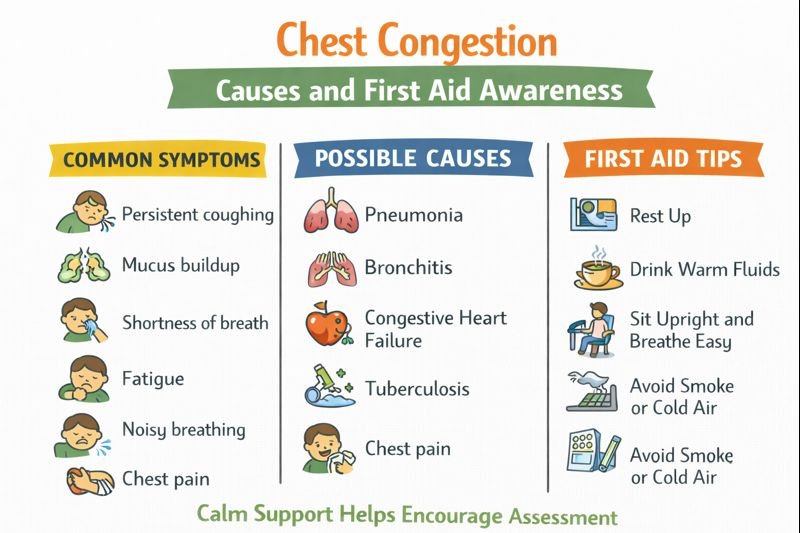Chest Congestion: Causes, First Aid Awareness, and Workplace Considerations in Canada
 Understanding Chest Congestion
Understanding Chest Congestion
Chest congestion occurs when mucus or fluid builds up in the lungs or airways, making breathing feel uncomfortable or difficult. It may cause coughing, chest tightness, tenderness, or a feeling of heaviness in the chest. Coughs associated with chest congestion can be productive (bringing up mucus) or dry. While chest congestion is often linked to common respiratory illnesses, in some situations it can signal a more serious underlying condition, which is why awareness and timely assessment matter.
First Aid & Workplace Relevance in Canada
In Canadian workplaces, chest congestion can affect stamina, concentration, and physical safety — particularly in jobs involving physical exertion or exposure to cold air. First aid awareness helps coworkers recognize when someone may need rest, hydration, or encouragement to seek further assessment if breathing becomes difficult. Calm, supportive responses promote safety without causing unnecessary alarm.
A Short Realistic Scenario
During a winter shift, an employee develops a deep cough and chest tightness that worsens throughout the day. A coworker trained in first aid awareness suggests taking a break, drinking warm fluids, and moving to a warmer area away from drafts. The employee feels slightly more comfortable and later decides to arrange a medical check when symptoms persist. Early awareness helps prevent overexertion.
Common Symptoms of Chest Congestion
Chest congestion may involve:
-
Persistent coughing (dry or productive)
-
Mucus buildup in the chest
-
Chest tightness or tenderness
-
Shortness of breath
-
Fatigue
-
Noisy breathing or wheezing
-
Discomfort when taking deep breaths
Symptom severity can range from mild to significant depending on the cause.
Possible Causes of Chest Congestion
Pneumonia
Pneumonia is an infection of the lungs that may be caused by bacteria, viruses, fungi, or parasites. It can also occur in people with weakened immune systems or certain chronic conditions. Symptoms often include:
-
Fever and chills
-
Fatigue
-
Difficulty breathing
-
Chest congestion
-
Cough with mucus
Pneumonia can range from mild to severe, and proper assessment helps guide appropriate care.
Bronchitis
Bronchitis involves inflammation of the bronchial tubes, the main airways that carry air into the lungs.
-
Acute bronchitis often follows a cold or respiratory infection.
-
Chronic bronchitis is linked to long-term airway irritation, commonly from smoking or ongoing exposure to lung irritants.
Both forms can lead to excess mucus production, coughing, and chest congestion.
Congestive Heart Failure
In congestive heart failure, the heart has difficulty pumping blood efficiently. This can cause fluid to back up into the lungs, leading to lung congestion. Shortness of breath and chest heaviness may become more noticeable during activity or when lying flat.
Tuberculosis
Tuberculosis (TB) is a bacterial infection caused by Mycobacterium tuberculosis. When it affects the lungs, symptoms may include:
-
Persistent cough
-
Chest pain
-
Chest congestion
-
Difficulty breathing
-
Fatigue
Early identification and professional care are important, as untreated TB can become serious.
First Aid Awareness and General Comfort Measures
For mild chest congestion symptoms:
-
Encourage rest and avoid strenuous activity.
-
Drink warm fluids to help loosen mucus.
-
Sit upright to support easier breathing.
-
Avoid smoke, cold air, and strong fumes.
-
Monitor breathing comfort and energy levels.
If breathing becomes laboured, chest pain increases, or symptoms worsen or persist, professional assessment is generally recommended. First aid awareness focuses on comfort and early recognition, not diagnosis or treatment.
Prevention and Workplace Considerations
-
Promote good hand hygiene to reduce respiratory infections.
-
Encourage staying home when ill to prevent spread.
-
Maintain clean indoor air and proper ventilation.
-
Reduce exposure to smoke and airborne irritants.
-
Support hydration and warm clothing during cold weather.
-
Include respiratory awareness in workplace first aid and wellness training.
Frequently Asked Questions
Can chest congestion be caused by a simple cold?
Yes. Respiratory infections can lead to mucus buildup, though symptoms usually improve with time and rest.
Is chest congestion always serious?
Not always, but persistent or worsening symptoms deserve attention, especially if breathing becomes difficult.
Why does sitting upright help?
An upright position allows the lungs to expand more easily and helps mucus drain.
Can heart conditions cause chest congestion?
Yes. Some heart conditions can lead to fluid buildup in the lungs, causing congestion.
How can coworkers help?
Encouraging rest, hydration, and avoiding exertion can support comfort until further assessment is arranged.
Educational Note
This information is provided for general public education and first aid awareness. Chest congestion has many possible causes, and learning early comfort and awareness measures can help individuals respond calmly and safely.

